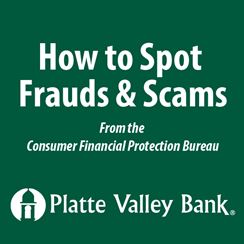How to Spot Frauds and Scams
August 23, 2016
You’ve heard the saying “If it sounds too good to be true, it probably is.” Common scams change, but you can protect yourself by learning how to spot the red flags that can signal a scam.
Promises of guaranteed riches
Scammers dangle the prospect of wealth to convince you to put your money into their deals. When the seller focuses only on how much money you can make, beware.
What you’ll hear
“You never have to work again.” “No risk.” “You’re guaranteed to make money.”
The truth
All real investments carry risk. Ask questions about where the profits come from, and what the risks are.
Pressure to act right now
Be cautious when you hear a sales pitch urging you to act immediately before an opportunity disappears.
What you’ll hear
“This is your chance to get in on the ground floor.” “If you don’t take this, someone else will.”
The truth
The fraudster may be trying to keep you from thinking carefully, researching, and talking to your family or a trusted adviser.
Special opportunity just for you
Be careful when someone claims to have inside information that’s not available to others. Keeping information secret is a sign there’s something the scammer doesn’t want others to see.
What you’ll hear
“This product is top secret.” “I have inside information that no one else knows.”
The truth
A legitimate adviser gives you written disclosures, answers your questions, explains risks, and discourages you from buying anything you don’t understand.
You’ve won!
Scammers say you’ve won the lottery or another big prize, but to collect, you have to pay an up-front fee or tax. Or, you’ll be invited to a “free lunch” seminar that’s marketed as educational, when in fact it’s a staged sales event.
What you’ll hear
“Congratulations, you’ve won the lottery!” “Come to a free dinner.”
The truth
You can’t win a lottery you didn’t enter, and you never have to pay to collect a real prize. Some companies offer “free lunch” seminars because they hope giving you something small will make you feel obligated to buy from them.
I’m just like you
Promoters sometimes target a particular faith community, social group, or ethnic group and work hard to be accepted, so you’re more likely to trust them. They’ll ask you personal questions, then use your answers to figure out what sales pitch will most appeal to you.
What you’ll hear
“Everyone is making money on this deal.” “Our church friends have all agreed.”
The truth
Hucksters know you’re less likely to ask questions if you trust them, so they use association with your friends, faith community, or social group as a shortcut to earn your trust.
I’m specially trained
To earn your trust, salespeople tell you they have special certifications, qualifications, or credentials. They want you to think they’re experts who know what’s best for you.
What you’ll hear
“I’m an expert adviser.” “I’ve been managing these kinds of investments for two decades.” “I’m a certified specialist.”
The truth
Credentials alone don’t guarantee expertise or the quality of someone’s training. It’s up to you to find out if a qualification is valuable.
Information provided by the Consumer Financial Protection Bureau.








